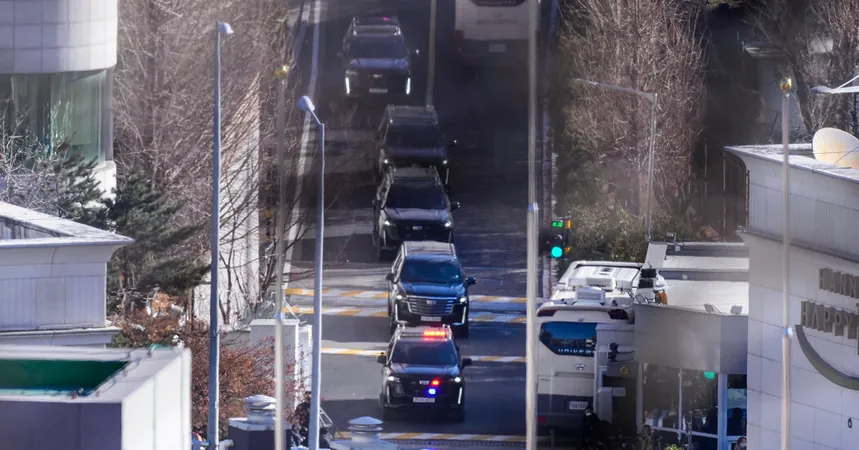
South Korea's President Faces Historic Detention Amid Political Turmoil
2025-01-15
Author: Yan
Historic Detention of President Yoon Suk Yeol
In a groundbreaking turn of events, President Yoon Suk Yeol of South Korea has become the first sitting leader in the nation’s history to be detained for questioning. The dramatic incident unfolded on Wednesday, signaling a profound political crisis that has ensnared the country. This detainment follows a tumultuous few weeks that included Yoon's controversial declaration of martial law, which sparked intense backlash and a struggle for political power.
Previous Standoff and Current Situation
Previously, on January 3, Yoon's security detail successfully thwarted investigators’ efforts to detain him, raising concerns about potential violence if tensions escalated further. However, on Wednesday morning, as authorities returned with an overwhelming police presence, Yoon’s bodyguards opted for a non-confrontational approach, allowing the questioning to proceed.
Video Message by President Yoon
In a video message released shortly after his detention, Yoon expressed his unwillingness to incite a "bloody" confrontation between his security forces and law enforcement. He labeled the investigation and accompanying warrant as illegal, emphasizing his commitment to his presidential duties despite the accusations leveled against him.
Opposition's Response and Political Fallout
The situation has drawn fierce criticism from the opposition-led National Assembly, which quickly moved to overturn Yoon's martial law decree last month, accusing him of insurrection for allegedly dispatching armed forces to seize control of the legislative building. This unprecedented step has ignited fierce debates regarding the limits of presidential power and accountability.
Constitutional Court's Evaluation
As if the stakes weren't high enough, the Constitutional Court is currently evaluating the legitimacy of the Assembly's December 14 vote for Yoon’s impeachment, as they deliberate on whether he should remain in office. The outcome of this judgment could dramatically reshape South Korea's political landscape.
Police Presence and Security Measures
On Wednesday, police buses gathered early outside the presidential residence where Yoon had been staying since the impeachment proceedings began. This was notable as it represented the first instance of a South Korean president facing military rule since the country's transition to democracy in the late 1980s.
Legal Representatives and Ongoing Negotiations
Yoon’s legal representatives initially reported that he had not been formally arrested, hinting at ongoing negotiations between his attorneys and investigators concerning his voluntary compliance. Even as tensions escalated, the likelihood of another standoff seemed possible as both sides braced for confrontation.
Fortified Compound and President's Vow
Following his previous standoff against investigators, President Yoon had fortified the compound with additional security measures, preparing for what he termed his ultimate struggle to reclaim his presidency. He vowed to fight against what he perceives as an unlawful court warrant.
Public Interest and Future Implications
These historic events echo through South Korea, with live broadcasts attracting national interest and igniting fears of potential violence as the conflict unfolds. With heightened tensions and public scrutiny, the stakes are at an all-time high. As the nation watches closely, questions linger: What will become of Yoon's presidency? Will this unprecedented investigation change the trajectory of South Korea's democracy? Only time will tell as this political drama continues to unfold.

 Brasil (PT)
Brasil (PT)
 Canada (EN)
Canada (EN)
 Chile (ES)
Chile (ES)
 Česko (CS)
Česko (CS)
 대한민국 (KO)
대한민국 (KO)
 España (ES)
España (ES)
 France (FR)
France (FR)
 Hong Kong (EN)
Hong Kong (EN)
 Italia (IT)
Italia (IT)
 日本 (JA)
日本 (JA)
 Magyarország (HU)
Magyarország (HU)
 Norge (NO)
Norge (NO)
 Polska (PL)
Polska (PL)
 Schweiz (DE)
Schweiz (DE)
 Singapore (EN)
Singapore (EN)
 Sverige (SV)
Sverige (SV)
 Suomi (FI)
Suomi (FI)
 Türkiye (TR)
Türkiye (TR)
 الإمارات العربية المتحدة (AR)
الإمارات العربية المتحدة (AR)